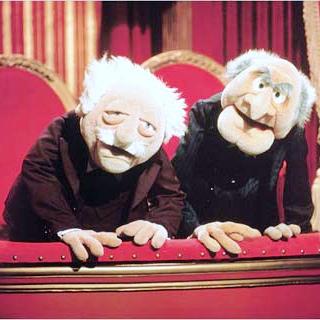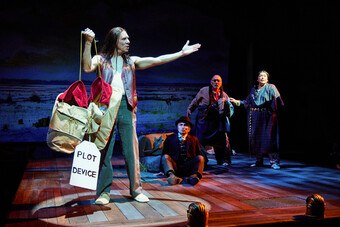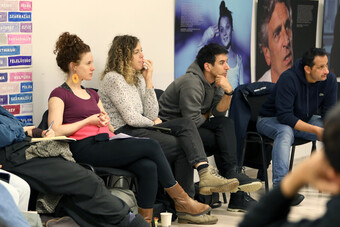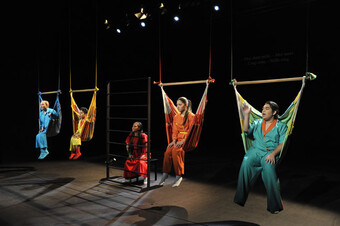The Artist on the Aisle
Say you walk out of the theatre having seen a show you hated, that you experienced as an assault on your senses, a waste of your time, or both. Who can you tell about it? If you’re lucky enough to have a circle of opinionated theatregoing friends, none affiliated with the production or any of its artists—or perhaps still better, if you have someone with no particular interest in theatre, but who will indulge your venting on any topic—you may stand some hope of unburdening yourself and purging your pain. Many of us, though, suffer truly bad theatre in polite silence, simultaneously angry that we were subjected to it and ashamed that it got to us so.
Or, let’s say, you leave the theatre having seen a show you loved that pushed your buttons, turned you on, or otherwise wholly delighted you. Who can you tell? You may tweet or Facebook-post your friends about it, or tell anyone who asks you what’s worth seeing—you may even feel guilty if you neglect to do so, as if you’ve forgotten to send someone a thank-you card. You are unlikely to ever be asked to defend or reconsider your positive reaction, either by fellow fans or by detractors—and should you encounter one of the latter, in person or in print, you may understandably shrink from the fight, preferring to leave your show-love alone, safely undisturbed in your memory.
Or, perhaps worst of all, you leave the theatre having seen a show that lay onstage like a dead fish wrapped in newspaper, that stirred you to neither anger nor affection, indeed made you feel no sensation at all but the faint stink of its averageness. You are likely to tell no one alive about this wasted evening, any more than you would feel compelled to narrate your latest uneventful trip to the post office. To recount the show’s tedium would be to relive it, provided you can even remember anything about the experience.
Now, if you’re any kind of fan of the maddening, seductive, quicksilver ephemera that is theatre—a fair bet if you’ve bothered to read this far—the various shades and degrees of noncommunication, inconsideration, and forgetfulness I’ve sketched above are probably not going to cut it. Being into theatre means arguing about the shows you’ve seen; the live event itself may be the central and indispensable element of theatregoing, but reverberating around that event, layered onto it, seeping into it, and helping to give it shape in our memory are the things we read, wrote, thought, argued, and rethought about it. Chances are good that if you care a fig for theatre, you will want to read more, think more, talk more about it. Even the numbing torpor of those dead-fish shows, you may find, can be eased when they’re put in conversation or contention with other shows.
If you’ve felt those impulses—to excoriate, extol, or exhale the theatre you’ve taken in—then congratulations! You have felt some inkling of what I would label, with no pretense to grandeur, the critical calling. It is rooted in nothing more complicated or ulterior than the urge to respond to the art we experience, and the corollary urge for that response to be heard and understood, much as we’ve striven to hear and understand the work at hand. There’s not a strict equivalence between the artist’s impulse to express and the critical urge to respond, but they run on parallel, interdependent tracks, and the people on both sides of the footlights, I think, can lay claim to the term “artist.”
It is rooted in nothing more complicated or ulterior than the urge to respond to the art we experience, and the corollary urge for that response to be heard and understood, much as we’ve striven to hear and understand the work at hand.

Photo by The Clyde Finch Report.
I don’t just mean that criticism, practiced at its highest level, can be an art. That should be self-evident from a browse through the collected writings of Bentley or Tynan or Clurman, or, in other realms, Kael or Bangs, all writers I’ve enjoyed reading as much or more than many of the works they write about, but more to the point, have richly enjoyed in conjunction with their subjects. I refer also to the grittier, less exalted ways in which theatre critics are as much like theatre artists as to be indistinguishable as a class: the meager pay, the struggle for recognition, the dwindling audiences and disproportionate power of a few make-or-break gatekeepers, the sense in which one is stuck with a habit as hard to shake as it is difficult to explain to outsiders, who tend to imagine what you do as either glamorous fun or corrupt, frivolous nonsense, but never honest work.
There’s a deeper affinity, and it’s rooted in the fact that critics and theatre artists literally share the same workplace for the most important part of their jobs. Glance again at that hypothetical list above—of miserable, ecstatic, and mediocre theatre experiences, and of various ways to respond—and consider that the true critic feels called, duty bound, and, if they’re lucky, contractually expected to respond publicly, and in more detail than most of us ever will, even with shrinking word counts, to all three kinds of shows, and many more varieties besides. If that sounds hard—on the soul, on the brain, on the ass—it is. And if it is not nearly as brave or as arduous as making or performing theatre—jobs with as much grind and obligation to them as inspiration and gratification—it is hard work when done well, and it is no more a job for just anyone than are acting or playwriting. We all may have felt the critical impulse, but no, not everyone is a critic.
You can get a good laugh wondering aloud whether any child dreams of growing up to be a critic, but in my case, the telltale signs go back to the age I could type. A cherished document circa sixth grade is a hand typed one-sheet parody of an ancient Greek newspaper, The Mythology Mirror, complete with weather report, obituaries, and a review of Euripides' The Bacchae (“The acting is, at worst, pedestrian”). As soon as I began forming any real taste in books and films and music—and theatre, to the extent it was available in Phoenix, Arizona—I became as voracious a reader of arts criticism and journalism as I was a consumer and amateur practitioner of the arts themselves (if I’m honest, more so). My school and my model, and really the rehearsals for the life and career I’ve made for myself, were the countless pre-Internet hours I spent in libraries in Arizona, digging up books and magazine articles about Evelyn Waugh and Paul Simon and Sergei Eisenstein, and later the numberless hours I spent in Los Angeles at film-revival houses, tiny storefront theatres, and used record stores, all the while reading and increasingly—and as I see it now in retrospect, inevitably—writing about the things I loved, hated, and was discovering or discarding.
My actual training, in the classroom sense, was in film and music, and though I’m still active in one of those pursuits (the one with lower overhead and more immediate gratification, natch), journalism is the profession that’s claimed me, and, for reasons as accidental as aspirational, theatre has been my main beat as a critic, reporter, and editor for around two decades. After graduating the University of Southern California with a film production degree that would prove to be mostly useless, I happened to work as a writer and editor at the Downtown News, a small free weekly, at a time when downtown Los Angeles happened to be the center of its own vibrant theatrical universe, or at least solar system: Reza Abdoh and Culture Clash were throwing down at the Los Angeles Theatre Center, those Kushner and Schenkkan epics were launching from the Mark Taper Forum, and there was even boisterous punk/pub theatre to be found at the late, lamented Al’s Bar.
Not long after, I got the gig as editor of Back Stage West and my scope expanded to the whole sprawling metropolis, just in time for a peak of creative ferment in the mid-1990s to the early aughts in the greater Los Angeles theatre scene, with the work of great ensemble companies (Cornerstone Theater Company, the Actors’ Gang, Circle X, Zoo District, Pacific Resident Theatre, the Fountain, Theatre of NOTE, the Open Fist, East West Players, A Noise Within, the Blank Theater Company, the Evidence Room, the Colony, the Matrix, the unofficial Justin Tanner repertory company at the Cast Theatre) looming as large, or larger, than the work of the region’s resident theatres.
I was formed as a critic by that particularly fertile period, and even as I broadened my viewing up and down the whole I-5 corridor, from Oregon Shakes to the Old Globe, and made obligatory forays to New York before finally moving here in 2005 and eventually expanding my purview, as my employer’s name indicates, to all of American Theatre, there is a part of me that is still most at home seeing shows in a repurposed modular black box with hand folded programs and sketchy street parking. Maybe this affinity for the DIY ethic resonates with my own autodidact’s path, though I wouldn’t push that analogy too far; I haven’t made my living at this by self-publishing a theatre fanzine or penning blog posts for free (well, not exclusively). I can say that I’ve found it useful to develop tastes as modular as those black box theatres, to learn to love theatre at its most flimsy and transparent as well as its most lavish and tricky, not only because a catholic taste gives me more to see and argue about (there’s a sense in which a critic is only as good as the shows he sees, and quantity can matter as much as quality). It’s also a constant lesson, a reorientation, to see the building blocks of the live experience—text and presence, light and sound, pace and space—combined and repurposed, shredded and reconstituted in new ways on all levels, to learn to see the commonalities and the contrasts more clearly.
There is plenty, in other words, for a critic to ruminate, reflect on, and write about without ever leaving their aisle seat—a lifetime, in fact. Which leads me, as I kick off a week of posts about the critical calling and its complications, to make two more quick points. First, the oft-voiced wish, from both sides of the footlights, that the line between critics and practitioners ought to be more blurred, and that a critic’s authority ought to be rooted in some practical theatrical experience, seems to me well-meaning but misguided. I wouldn’t mind seeing more crossover and less anxiety about conflict of interest—I’m not in principle opposed to practitioners reviewing each other or journalists trying their hand at making theatre, but in practice the results would speak for themselves. One of these jobs would eventually have to take a backseat if the critic/practitioner wants to actually be good at either. (I speak with my own appropriately blurry authority on this, as a sometime theatre practitioner who no longer writes regular theatre reviews, though running StageGrade keeps me near the fray.) If you think the critical discourse on theatre now is already too thin and scattershot—a fair charge—I am hardly confident that practicing theatre artists, quite apart from fearing to offend their peers or their careers with negative reviews, would want to put in the time and commitment to report as reliably and consistently on all the good, bad, and ugly plays that deserve an accounting as would the artist who has felt called to the wholehearted, concentrated task of “standing up in the back and telling everybody what I saw,” as music critic Robert Christgau put it in a recent interview.
And that leads to my final related point. When new critics would join the stable at Back Stage West, I would give them a “Review Policy” handout that advised, “Always keep this in mind: No matter how crappy or half-baked an evening of theatre is, the people onstage and backstage have dedicated much, much more time and effort to producing it than you ever will to producing a review of it.” That was true and good advice, written by an uppity twentysomething editor who presumed to school his fellow critics (Charles Isherwood, for one, began reviewing plays at Back Stage West, though I can’t say for sure that he ever got that handout). A few decades later, I still stand by that basic estimate of proportion, but I’d add this: The critic may spend less time on any single review of a single show than anybody involved in that show. But chances are good, if they’ve been at it for any good length of time—decades, say—that any critic worth their salt has put in a comparable amount of time and effort over a lifetime reading and thinking and writing on the subject at hand, sitting on that aisle taking notes, hoping for the best, and looking for outlets to tell everyone who’ll listen what they think. That’s plenty of job, and joy, for most of us.










Comments
The article is just the start of the conversation—we want to know what you think about this subject, too! HowlRound is a space for knowledge-sharing, and we welcome spirited, thoughtful, and on-topic dialogue. Find our full comments policy here
Rob, thanks for the reference to my article. Sorry you find my and many other practitioners' fervent wish that room be made at the table for active or emeritus theater makers as theater critics to be misguided misguided. Although of course that's been the position of all the folks coming from the critic's bench so far so I am not surprised to read it.
As we watch more and more papers get rid of their critics and theater reviews, one thing I would ask you, as I asked Jason Z when he recently debated with me about this on Facebook is- what are your suggestions for invigorating and revitalizing the field of criticism? Other than grasping tightly at the few remaining paid positions in the field, which are shedding rapidly and will probably be mostly gone within a generation or so, I've yet to hear a theater critic offer any particular solution..
I strongly disagree with your assertion that you must choose a vocation as either critic or practitioner, that you can't be good at both. That sort of segmenting in theater in general has been only detrimental to the field and is unrealistic and untrue. How many artistic directors have also become more than proficient fundraisers, how many playwrights excellent marketers, how many actors have turned directors, and turned back again to acting, and then written an excellent play and on and on.
Theater is full of the hyphenate, the can-do multi-tasker, those who can hang from a 40 foot ladder to focus a light, build a dream of a set out of a piece of fabric, figure out why after 40 times of working, on the 41st night the sound cue didn't play.. Although the trained critics may excel at and more fervently enjoy the pleasures witty quip and the snarky put down, as Jason mentioned here in his HowlRound piece on criticism, I am not too concerned about what will happen if in the act of including more practitioners, we lost both. I feel that the focus on wit as well as in many papers a Thumbs Up/Thumbs Down mode of critical response has had a direct correlation to the decline of interest and usefulness in theater reviews.
The review is not a consumer report on what kind of car is best.. it's not a book report on a piece of writing you just read.. it's not a paean to a leading actress's looks, it's not a chance for racist or misogynist commentary.. and yet so many reviews I read from 'real' theater critics include any or all of the above. So many reviews I've read from 'real' theater (and dance) critics include obvious or less obvious statements that they don't enjoy this writer, this genre, this theater, this choreographer, this style of.. whatever! So many reviews have a tone that's bored and irritated, because the act of daily reviewing has forced the reviewer to see many mediocre works. So.. for these and many other reasons (it is late night in Barcelona and I don't want to ramble too long), we need a change.
I am strongly concerned about the slow strangling death of criticism- in terms of its importance in society, and its loss of page inches across the nation. I posit that the inclusion of major practitioners as critics will have a strong revitalizing presence in the field. I don't necessarily believe they have to be daily critics- and not every city may actually have enough work that they need daily coverage- but I think they could certainly commit to some kind of regular reviewing schedule. I am also not proposing that 'regular' critics be let go. I am talking about integrating new voices in.. we desperately need new voices.
This essay, on Backstage West's cutting out reviews, touches on the topic- http://dramalit.wordpress.c... "I feel that rather than discontinuing theater reviews all together (which seems a bit dramatic), they instead should take this as a message from readers that they’re looking for new, fresh voices in the theater community. If I were reading more reviews written from a dramaturgical mind-set, or written by respected playwrights and directors, I’d be more interested."
Thanks for all you do at American Theater, I am your fan!
Best,
Sherri K.
I would also like to quote Andy Horwitz, Editor of Culturebot, who made this point in reference to another article, the call for critics for a new HowlRound project. Again he wasn't writing about what I'm talking about, yet the points are relevant to this- "What the field actually needs is legitimate, honest, open peer review like we see in science journals or artist-to-artist "crit" like they teach in visual arts schools. Playwrights and directors need to actually learn how to talk directly to each other openly, honestly and constructively about what they really think about each others' work. ... For work to get better and the field to improve, practitioners need to risk saying in public the things that they say to each other privately in bars. It is counterproductive, and frankly disingenuous, to pretend to objectivity or separate one's roles as maker and responder.
[At Culturebot] We've always supported conversation by people with multiple hats - makers, administrators, critics - because generally they *are* a big swath of "audience. In fact, the the whole issue of the perceptual divide between audience and artist is a rich area for examination."
If anyone cares, I never wrote that critics "more fervently enjoy the pleasures witty quip and the snarky put down" than anyone else. What i did do as anyone can click over and see for themselves is try to explain the pleasures of the job, and in listing many of them, i conceded that it is indeed true that one was crafting a "sharp put-down." I find no pleasure in pointing this out.
Hi Jason, we meet again! :) I'll include your quote here so folks can draw their own conclusion, pretty sure that my point in referencing it above still stands: "As artists suspect, there are the pleasures of a sharp put-down. And if you believe as I do that art matters as much as politics, harshness in the service of evidence-based passion has its place. So does wit. I enjoy the tussle and combat of criticism, for reasons that are not just temperamental."
Also I am really excited by HowlRound's own call for critics. In explaining further in the comments following her call, Polly Carl described a really exciting imagining of the role and placement of critics in the process of the work.. "Just to be clear, by positive inquiry, we don't mean positive reviews or positive criticism. I think if anything we've proved on HowlRound that we can take on very contentious topics through the idea of positive inquiry—which means we seek to provoke dialogue and encourage group problem solving while avoiding personal attacks. When we say positive inquiry around criticism we mean inquiry that encourages deeper understanding of the work, and invites artists into the conversation about their plays and performances. So much of the thumbs up/thumbs down criticism seeks to close off conversation, to destroy productions and people. Or they are mindlessly positive to drive ticket sales. We're not advocating either approach. We work hard at HowlRound to create a public platform for difficult conversation, and positive inquiry proves a useful lens."
Great ideas and advice! I see over 150 plays a year, a pace I've kept up for over twenty years of writing reviews. Add the reading, the teaching, the writing ... Yes, I've put the time and effort in. I love my job, though it's only part-time, not my "real job."
I remember receiving that handout from you when I became a Bay Area stringer for Back Stage West in 1996 or so. Good advice then -- and now. Thanks for writing this.
First, thanks for the clarion call to exercise that urge to respond. If theatre is meant as a conversation that society has with itself, then conversations about that conversation form an indispensable harmonic series to make richer the original striking.
And second, I find it an extraordinary coincidence that, on the morning I watch a video of "Minimata," you mention Reza Abdoh and that fertile time at LATC.
April is off to an exhilarating start.
Thank you. It's a joy to read the words of a true critic. Your love of art shines.